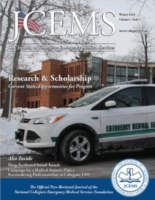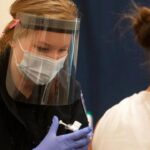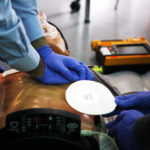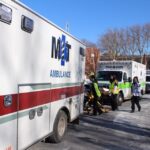Guide for Authors
 The Journal of Collegiate Emergency Medical Services (JCEMS) [ISSN: 2576-3687 (Print), 2567-3695 (Online)] is the official, peer-reviewed journal of the National Collegiate Emergency Medical Services Foundation. Established in 2017, JCEMS publishes the only scholarly journal and news source dedicated exclusively to the collegiate and campus-based EMS community. We welcome original research manuscripts, case studies, and reviews. In addition, we invite pieces featuring news and commentary, expert perspectives and opinions, advice on best practices, and letters to the editor.
The Journal of Collegiate Emergency Medical Services (JCEMS) [ISSN: 2576-3687 (Print), 2567-3695 (Online)] is the official, peer-reviewed journal of the National Collegiate Emergency Medical Services Foundation. Established in 2017, JCEMS publishes the only scholarly journal and news source dedicated exclusively to the collegiate and campus-based EMS community. We welcome original research manuscripts, case studies, and reviews. In addition, we invite pieces featuring news and commentary, expert perspectives and opinions, advice on best practices, and letters to the editor.
Mentorship & Assistance for Authors & Researchers
Our Editorial Board is committed to working with authors at every stage of the research and publication process, all the way from study design to manuscript preparation and review. We understand that the research and publication process can be daunting, particularly for young researchers and clinicians. Our mission is to spur research in the underrepresented field of campus-based prehospital emergency care and to develop budding researchers and clinicians.
We encourage you to contact our Editors at JCEMS@CollegeEMS.com if you might be interested in conducting a study or writing an article of relevance to the collegiate EMS community. Our Editors and Editorial Board would be thrilled to provide advice or connect you with a mentor who could answer any questions regarding topic selection, research design, data analysis, manuscript writing, submission guidelines, and the publication process. Our Editors and Editorial Board may also be able to help connect you with partners for collaboration in research and writing. Please understand that while our Editors and Editorial Board may provide advice and determine whether your article might be of appropriate scope for JCEMS, we cannot provide insight into your chances of acceptance prior to submission.





